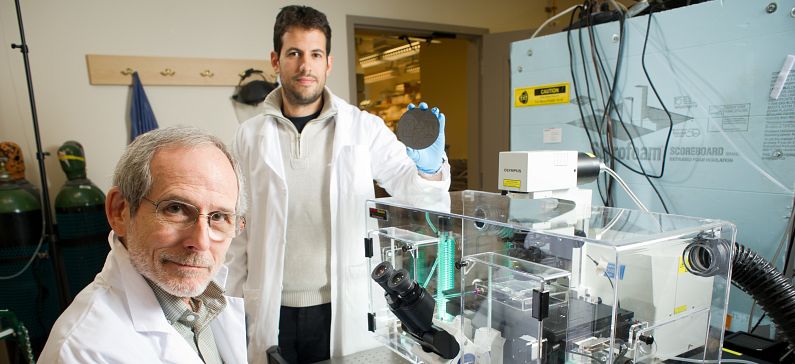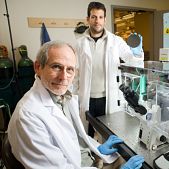
The developer of the 3D in vitro microfluidic device
Ioannis Zervantonakis is studying the mechanics of metastasis, the process of cancer cell migration from one location in the body to another and the cause of more than 90% of cancer deaths. He designed and developed a device to look at the importance of signaling between tumor cells and macrophages.
Zervantonakis developed one of the first systems to look at the importance of signaling between tumor cells and macrophages, a type of white blood cell with a versatile role in the immune system. The device enables to visualize the cells at very precise locations within the system and discovered that macrophages do not need to be in physical contact with the tumor cells but simply close enough to communicate with them.
Through this system Zervantonakis and Roger Kamm, professor of MIT, found that when macrophages are absent, it is extremely rare for tumor cells to migrate across the cell layer that lines the blood vessels but when they are present, the rate of entry increases significantly.
Also they detected cell-to-cell communication between both invasive tumor cells and normally protective macrophages and, subsequently, between traitor macrophages and the blood vessel. The result is increased leakiness of the vessels and tumor cells that can enter them.
Zervantonakis began his studies at the National Technical University of Athens where he got his diploma in Mechanical Engineering in 2006. In 2003 he started also his MSc in Mechanical Engineering at the Technical University Munich in the same field till his graduation in 2005.
In 2006 he entered Columbia University where he completed the Biomedical Engineering courses and was a graduate research assistant in the field of Ultrasound Elastography and Cardiac Mechanics in the Ultrasound Elasticity Imaging Lab with Prof. Elisa Konofagou.
Zervantonakis afterwards registered at the Massachusetts Institute of Technology (MIT) for his Ph.D. and as a graduate research assistant worked in the field of cancer cell invasion and angiogenesis in the Mechanobiology laboratory under the supervision of Prof. Roger Kamm.
From January 2013 till present, he is a postdoctoral research fellow at the Harvard Medical School in the lab of Dr. Joan Brugge in the Department of Cell Biology.








